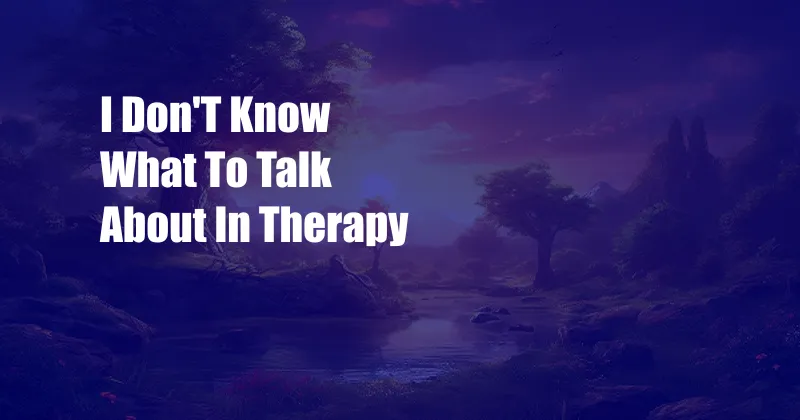
I Don’t Know What to Talk About in Therapy
Starting therapy can be daunting, and figuring out what to talk about can be even more challenging. You may feel like you have nothing to say or that your problems aren’t “big” enough. But the truth is, everyone has something to gain from therapy, and there’s no such thing as a silly or unimportant problem.
If you’re feeling stuck, here are a few tips for getting started:
Talking About the Past
What to Talk About
Your past can have a big impact on your present, so it’s often helpful to explore your experiences in therapy. This could include talking about your childhood, family relationships, trauma, or anything else that has shaped who you are.
Talking about the past can be difficult, but it can also be incredibly healing. When you share your story with someone who is understanding and supportive, you can start to make sense of your experiences and move on from them.
Talking About the Present
What to Talk About
In addition to talking about the past, it’s also important to talk about the present. This includes your thoughts, feelings, and experiences in the here and now. What are you struggling with? What are you grateful for? What are your goals?
Talking about the present can help you identify patterns in your life and develop strategies for coping with challenges. It can also help you build a stronger sense of self-awareness and self-acceptance.
Talking About the Future
What to Talk About
It’s also helpful to talk about the future in therapy. What are your hopes and dreams? What are you afraid of? What do you want to achieve? Talking about the future can help you set goals, make plans, and develop a sense of purpose.
It can also help you identify potential roadblocks and develop strategies for overcoming them.
Tips for Getting Started
If you’re feeling stuck, here are a few tips for getting started:
- Write down a list of topics you’d like to cover before each session.
- Bring a journal to your sessions and write down your thoughts and feelings between sessions.
- Talk to your therapist about your difficulty talking about certain topics.
Remember, therapy is a journey, and it takes time to build a relationship with your therapist and to identify the issues you want to work on. Be patient with yourself, and don’t be afraid to ask for help.
FAQs
Q: What if I don’t have any problems?
A: Everyone can benefit from therapy, even if you don’t have any major problems. Therapy can help you improve your relationships, manage stress, and achieve personal growth.
Q: How often should I go to therapy?
A: The frequency of your therapy sessions will vary depending on your needs and goals. Some people go to therapy once a week, while others go less frequently. Talk to your therapist about what is right for you.
Q: How do I find a good therapist?
A: It’s important to find a therapist who you feel comfortable with and who you think can help you achieve your goals. Ask your friends or family for recommendations, or search online for therapists in your area. You can also contact your insurance company to see if they have a list of in-network providers.
Conclusion
If you’re struggling to figure out what to talk about in therapy, don’t worry. With a little time and effort, you’ll be able to identify the issues you want to work on and start making progress towards your goals.
Are you interested in knowing more about therapy?